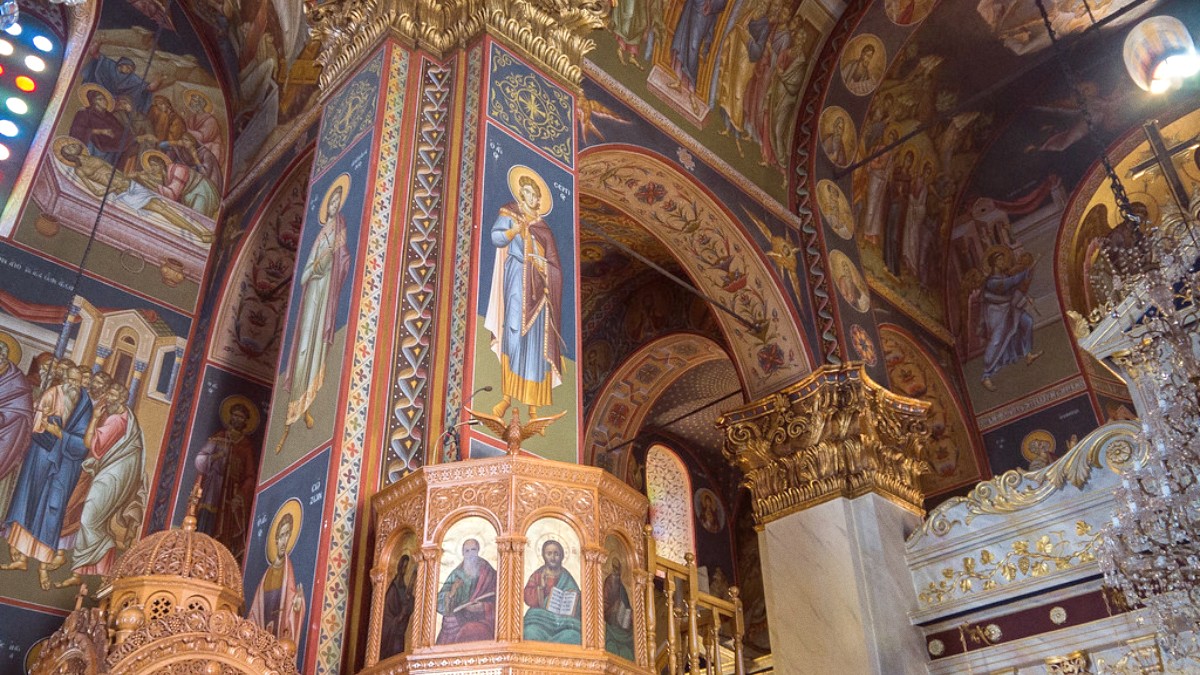
The Peloponnese, Greece
Kalamata has a Mediterranean climate. This means hot, dry summers and mild, wet winters. Summers (June-August) see high temperatures, typically 25-35°C (77-95°F), with rare rainfall. The sea is warm, a good setting for beach activities.
Autumn (September-November) temperatures gradually cool. September has averages of 20-28°C (68-82°F), with the sea still warm. October maintains pleasant temperatures, 15-25°C (59-77°F). November brings cooler weather, 10-20°C (50-68°F), and more rain. This season has a comfortable climate for outdoor exploration.
Winter (December-February) marks the wettest and coolest period. Temperatures average 5-15°C (41-59°F). While mild compared to northern European winters, cold fronts can bring lower temperatures and more consistent rain. Snow is rare in the city but can occur in the Taygetus mountains.
Spring (March-May) temperatures rise steadily, from 10-20°C (50-68°F) in March to 20-28°C (68-82°F) in May. March may still have cool days and some rain. April and May bring increasing sunshine and lower precipitation, making them very pleasant months. Wildflowers bloom, and the landscape appears lush. The sea begins to warm for swimming by late May.
July-August
Warmest sea temperatures, all tourist services available, long daylight hours.
Highest prices, crowds, intense heat can make sightseeing uncomfortable.
May-June, Sep-Oct
Pleasant temperatures, fewer crowds, moderate prices, sea warm for swimming.
Smaller seasonal businesses may be closed early/late season.
Nov-April
Lowest prices, very few tourists, good for cultural exploration and mild hiking.
Many coastal businesses closed, cooler temperatures, higher chance of rain.
Summer months may bring heatwaves, with temperatures over 40°C (104°F) for several consecutive days. Stay hydrated, seek shade during the hottest parts of the day, and limit strenuous outdoor activity. Wildfires pose a risk during dry summer months, notably in forested areas. Pay attention to local news and official warnings. Avoid discarding cigarettes or creating open flames in natural environments.
Winters, while mild, can feature periods of heavy rain and strong winds. Pack a Waterproof jacket and umbrella if visiting during this time.
June, July, August, early September.
May, early June, September, October.
April, May, October, early November.
Late October to early December for an unique experience.
Kalamata International Dance Festival in July. Local calendars have other events.
Greece is part of the Schengen Area, a zone of 27 European countries that abolished passport and all other types of border control at their mutual borders.
Citizens of many countries do not need a visa for stays up to 90 days within any 180-day period. This applies to tourism, business, or short visits. Countries include the United States, Canada, United Kingdom, Australia, New Zealand, Japan, South Korea, and Brazil.
Citizens from countries not on the visa-exempt list must apply for a Schengen visa. This application takes place through the Greek Embassy or Consulate in your country of residence before you travel.
No general entry fees apply for tourists visiting Greece. Upon arrival at Kalamata International Airport (KLX) or any other Greek port of entry, you will go through standard immigration procedures.
Greece uses the Euro (€). These daily averages are a general guide. Your actual spending will vary.
The official currency of Greece is the Euro (€, EUR). ATMs are widely available throughout Kalamata. They deliver a way to withdraw Euros. Check with your bank about foreign transaction fees and withdrawal limits before you travel.
Visa and Mastercard are widely accepted in hotels, restaurants, larger shops, and supermarkets. American Express and Discover are less common. Carry some cash, as smaller shops, local markets, street food vendors, and tavernas in more remote villages may prefer or only take cash. Taxis often prefer cash.
Expect to spend €40-70 per day. Look for hostel beds or basic guesthouse rooms (€20-35). Eat street food (€3-6) or buy groceries (€5-10). Use public buses (€1.20-1.70) and walk. Enjoy free attractions like the beach and railway park.
Affordable stays and meals.
Limited dining choices.
Budget €70-150 per day. Stay in 3-star hotels or comfortable apartments (€50-90). Enjoy local tavernas and mid-range restaurants (€25-50). Mix public buses with occasional taxis. Include museum visits and organized tours (€10-30).
Good value with comfort.
Some activities may exceed budget.
A daily budget of €150+. Stay in 4-5 star hotels or boutique properties (€100-250+). Experience fine dining (€60-150+). Use private transfers and rental cars. Opt for private guided tours or exclusive boat trips (€40-100+).
Premium experiences and convenience.
Highest daily costs.
| Category | Item | Price Range (EUR) |
|---|---|---|
| Accommodation (per night) | Hostel/Guesthouse | €20-40 |
| Accommodation (per night) | Mid-range Hotel | €50-100 |
| Meals | Street Food (Gyros) | €3-6 |
Kalamata is a generally safe destination. Preparing for common scenarios is always wise.
Consult a healthcare professional. Routine vaccinations like MMR, Diphtheria-Tetanus-Pertussis, and Varicella. Hepatitis A and B are often suggested. Rabies for high-risk activities.
Use High-SPF sunscreen (30+), wear Wide-brimmed hats and Sunglasses. Seek shade during peak sun hours (11 AM - 4 PM). Drink plenty of water. A Reusable water bottle is useful.
Mosquitoes are common in evenings. Use Insect repellent with DEET or Picaridin. Wear long sleeves and pants.
General Hospital of Messenia handles emergencies and general medical care.
Pharmacies (Farmakeio), marked by a green cross, are common. Pharmacists offer advice for minor ailments and provide many over-the-counter medications. Many speak some English.
For EU citizens, the European Health Insurance Card (EHIC) provides access to state-provided healthcare under the same conditions as Greek citizens.
Affiliate partner for first aid supplies: Adventure Medical Kits.
Connects to police, ambulance, fire services throughout Greece. Operators can direct your call.
Police: 100, Ambulance: 166, Fire Department: 199.
Have contact information for your country's embassy or nearest consulate in Greece.
Kalamata has a low crime rate and is a safe city for tourists. Petty theft may occur in crowded areas.
Travel insurance brings peace of mind and is a worthwhile investment.
Covers medical emergencies and hospitalization.
Covers trip cancellation, interruption, and delays.
Covers lost, stolen, or damaged luggage and personal items.